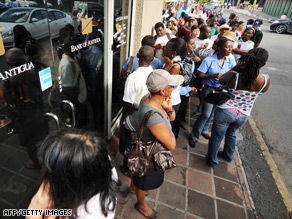
A financial analyst who studied public documents about Stanford International Bank for a friend who was considering investing in it said Thursday that it took only a cursory look to determine something was wrong.
“It was kind of shocking, but then I began to think about who would actually be looking at this and who should be looking at this,” Alex Dalmady told CNN. “And I came to realize that there weren’t many people who had to look at this.” U.S. regulators have accused the founder of the Antigua-based bank, Allen Stanford, of orchestrating a $9.2 billion investment fraud scheme. Regulators have already taken control of the bank and financial institutions run by Stanford, and Venezuela’s government has frozen bank accounts belonging to board members of his Bank Venezuela. “It’s a bank that caters only to individuals, so there is no bank due diligence,” Dalmady said. “The regulators were perhaps slacking off a bit at the job, and that would be the Antiguans.” Dalmady said he tried to blow the whistle before any of that happened, in an article called “Duck Tales,” published in the January issue of VenEconomy Monthly. “I wrote an article for people to read and understand that there is a number of things in these numbers and in the organization that are not right and should be looked at,” he said. “My conclusion: if it looks like a duck and it walks like a duck and it quacks like a duck, it’s a duck.”
Don’t Miss
Stanford Financial Group officer arrested
Venezuela freezes Stanford Bank board’s assets
Stanford Bank scandal spreads
Cricket banker charged in ‘global fraud’
The article listed warning signs common to financial scams: they are too good to be true; they can do what no one else can; there are few people overseeing everything; there are few incentives for whistleblowers to come forward. Stanford International Bank fit each one, Dalmady wrote: • It offered rates of return on certificates of deposit at 7.5 percent, when U.S. banks were offering 4 to 5 percent. • Its deposits had grown from $624 million in 1999 to more than $8.4 billion by the end of 2008, an astonishing compound growth rate of 34 percent. • Only 75 people worked for the bank on the island, and its investments were overseen by far fewer. • And it reported an 11.4 percent return on its portfolio for 2007, when the Standard and Poors 500 index returned 3.8 percent. “This could seem quite ‘normal’ for someone who is not in the investment world, but these performance figures are very, very good … on the ‘limit of the credible universe,’ ” Dalmady wrote. And what about the stockholders “There is only one,” Dalmady said. “He has the title of chairman of the board and doesn’t appear to have management responsibilities at the bank.” Though the bank was audited, its auditor had not changed in a decade, he said. And local regulators in Antigua had little incentive to look closely at the bank’s books, he added: “If the bank goes elsewhere, who is going to build schools and maintain the roads and gardens” Asked Thursday why he chose to blow the whistle, Dalmady said, “I wouldn’t feel good with myself if I hadn’t.” He said that since his article was published, he has gotten calls from desperate-sounding people who invested with the bank. “They don’t know if their money is safe, and you feel for them, because it’s not like they’re stupid or even greedy or anything.” Last Thursday, the FBI announced federal agents had located Stanford in Fredericksburg, Virginia, and served him with papers accusing him and three of his companies of fraud. He was not taken into custody, and no criminal charges were filed against him. Watch more about Allen Stanford » A day later, Antiguan and Barbudan regulators took control of Stanford’s financial institutions on the twin-island nation. The chief investment officer of Stanford Financial Group was arrested Thursday on a criminal complaint that charged her with criminal obstruction, the Justice Department said.
Laura Pendergest-Holt is to appear Friday before U.S. Magistrate Mary Milloy at the federal courthouse in Houston, Texas. Efforts by CNN to reach Stanford or his representatives have not been successful.